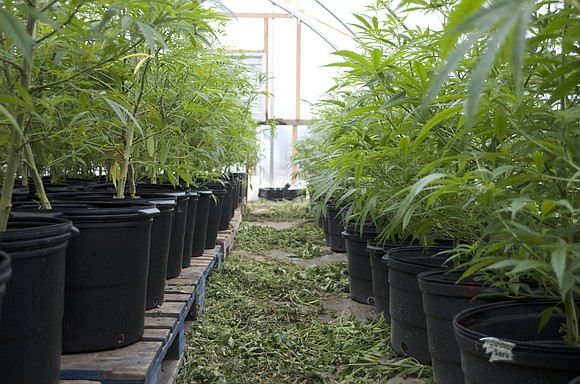Hemp: Virginia’s new big cash crop?
By Daniel Berti and Andrew Gionfriddo/Capital News Service | 5/3/2019, 6 a.m.
JARRATT
At first glance, it looks like a stoner’s paradise: Acres of plants that resemble marijuana. But this crop is hemp, a relative of cannabis that has commercial uses ranging from textiles and animal feed to health products.
Officials at the Southern Virginia Hemp Co., as well as other farmers and processors of the plant, say hemp could be a big boost to the state’s agricultural sector as demand for tobacco wanes. And it just got much easier to grow hemp in the commonwealth.
Lawmakers have amended the state’s hemp laws to match the rules in the 2018 federal farm bill passed by Congress. Virginia farmers now can grow hemp for producing cannabidiol, or CBD, a naturally occurring chemical that some say has mental and physical health benefits.
CBD products have become popular during the past few years, with some industry analysts predicting the CBD industry will be worth $22 billion by 2022. Until now, only researchers at Virginia universities could grow hemp for making CBD.
The Virginia Department of Agriculture and Consumer Services has seen a surge in grower and processor applications since Congress passed the farm bill in December. The agency expects the number of applicants to increase even more now that Virginia has amended its hemp laws to match the federal laws.
“VDACS was not issuing registrations to processor applicants who indicated that their sole goal was to sell a hemp-derived CBD to the public,” said Erin Williams, a spokesperson for the agency. “With the 2019 amendment, I think it will clear up the gray area.”
As of Tuesday, the department had issued 629 grower registrations and 92 processor registrations. So far, Virginia hemp growers are planning to cultivate more than 2,000 acres of hemp this year.
In Southside Virginia, where tobacco growers have been hit hard by declining sales and tariffs on their products, farmers increasingly are turning to hemp as a potential cash crop that can be grown in addition to tobacco. Southside Virginia has more registered hemp growers than any other region in the state.
“There’s significant interest in Southside Virginia, particularly among tobacco growers who are looking to add a crop to what they’re doing,” Ms. Williams said.
For years, several other states have allowed farmers to grow hemp for the manufacture of CBD products. But Virginia farmers were barred from doing so until lawmakers approved House Bill 1839 in February.
Gov. Ralph S. Northam signed the bill into law on March 21. Thanks to an emergency clause, it took effect immediately.
The legislation comes on the heels of the 2018 federal farm bill, which established a regulatory framework for the commercial production of hemp. HB 1839 conforms Virginia’s hemp laws to match the provisions of the federal bill.
The Southern Virginia Hemp Co., a farm in the town of Jarratt straddling Greensville and Sussex counties, is expanding its operations to meet the demand for CBD products. The company plans to grow between 75 and 150 acres of hemp this year and aims to hire 40 additional employees to work on the farm this summer.
Wayne Grizzard, owner of the Southern Virginia Hemp Co. and Virginia Homegrown Botanicals, said the new laws could have a positive impact for farmers across the commonwealth, especially for tobacco farmers who have been hit hard by tobacco tariffs levied against the United States by China.
“One of my partner’s farms was for tobacco. He lost all three contracts this year because of the tariffs,” Mr. Grizzard said. “Some of the farmers have been forced to grow hemp because they don’t have anything to replace it.”
Since colonial times, Virginia farmers — even George Washington — have planted hemp, using the fiber to make rope and other goods. Historians estimate that by the mid-18th century, Virginia had 12,000 acres cultivated for hemp. Marijuana and hemp were both banned in the 1930s under the Marihuana Tax Act, however.
Now, Mr. Grizzard, once a vegetable farmer, has converted his entire farm to hemp.
“When we first started growing, everybody kind of turned their nose up because it’s cannabis,” Mr. Grizzard said. “Once they started realizing that everybody’s getting into it and there’s money involved, they started singing a different tune.”
Until now, Virginia’s hemp industry has failed to keep pace with neighboring Kentucky and North Carolina. Both states have been eyeing hemp as an economic driver for several years.
In 2019, the Kentucky Department of Agriculture approved 1,035 applications to cultivate up to 42,086 acres of industrial hemp, as well as 2.9 million square feet of greenhouse space for hemp cultivation.
North Carolina has 634 licensed farmers growing hemp on about 8,000 acres and 3.4 million square feet of greenhouse space.







